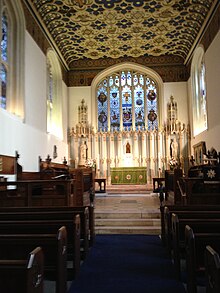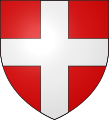Savoy Chapel
| Savoy Chapel | |
|---|---|
 Queen's Chapel of The Savoy east aspect | |
 | |
| 51°30′38″N 0°07′12″W / 51.5105°N 0.1199°W | |
| Location | London WC2 |
| Denomination | Church of England |
| Churchmanship | Anglicanism |
| Website | royalchapelsavoy.org |
| History | |
| Status | Church (royal peculiar) |
| Architecture | |
| Functional status | Active |
| Architect(s) | Richard Griffiths Architects (renovators of the Savoy Chapel)[1] |
| Style | Tudor; Perpendicular |
| Completed | 1512 |
| Specifications | |
| Capacity | approx. 180 |
| Length | 200 ft (61 m) (nave) |
| Materials | Stone |
| Administration | |
| Province | Canterbury |
| Clergy | |
| Chancellor | Rt Hon Oliver Letwin MP |
| Chaplain(s) | Revd Prof Peter Galloway OBE |
The Savoy Chapel, or the Queen's Chapel of the Savoy, is a church dedicated to St John the Baptist, located just south of the Strand, London, next to the Savoy Hotel.
Originally founded in the Middle Ages as part of the main church of the Savoy Palace (later the Savoy Hospital), the ancient hospital had fallen into ruin by the 19th century and only the chapel survived the demolition enabling construction of an approach road at the north of Waterloo Bridge.
The chapel remains governed by the Duchy of Lancaster and as such is a royal peculiar, not being under the jurisdiction of a bishop, but under that of the reigning monarch. It is designated as a Grade II* listed building.[2]
History
The original chapel was founded as part of Peter of Savoy's palace which was destroyed during the Peasants' Revolt of 1381. The present chapel building commenced in the 1490s (being completed in 1512) by Henry VII as a side chapel off the Savoy Hospital's 200-foot (61 m) long nave (the nave was secular rather than sacred, held 100 beds and was demolished in the 19th century).
The Savoy Chapel has hosted various other congregations, most notably that of St Mary-le-Strand whilst it had no church building of its own (1549–1714). Also the German Lutheran congregation of Westminster (now at Sandwich Street and Thanet Street, near St Pancras[3]) was granted royal permission to worship in the chapel when it separated from Holy Trinity (the City of London Lutheran congregation now at St Mary-at-Hill).[4] The new congregation's first pastor, Irenaeus Crusius (previously an associate at Holy Trinity), dedicated the chapel on the 19th Sunday after Trinity 1694 as the Marienkirche or the German Church of St Mary-le-Savoy.
An Anglican place of worship, the chapel was noted in the 18th and 19th centuries as a place where marriages without banns might occur outside of the usual parameters of ecclesiastical law of that time.[5] It was referred to in Evelyn Waugh's Brideshead Revisited as "the place where divorced couples got married in those days—a poky little place".[6] In 1753, Archibald Cameron of Lochiel, the last Jacobite leader to be executed for treason, was buried there. In 1939, it was announced by the office of the Duchy of Lancaster that the Savoy Chapel would be known as The King's Chapel of the Savoy.
Many of the chapel's stained glass windows were destroyed in the London Blitz during World War II. However, a triptych stained glass memorial window survives which depicts a procession of angelic musicians. It is dedicated to the memory of Richard D'Oyly Carte (who was married at the chapel in 1888) and was unveiled by Sir Henry Irving in 1902; after their respective deaths, the names of Rupert D'Oyly Carte[7] and Dame Bridget D'Oyly Carte were added.[8]
Present


The chapel has been Crown property for centuries as part of the Savoy Hospital estate and remains under the aegis of the monarch as part of the Duchy of Lancaster and thereby is a royal peculiar. The chaplain is appointed by the Duchy (and since 1937 as ex-officio chaplain of the Royal Victorian Order) and effectively it is "parish church" of the Savoy Estate, the Duchy of Lancaster's principal London landholding. Armorial plates commemorating GCVOs past and present are displayed throughout the chapel; the Royal Victorian Order's present Honorary Genealogist is David White, Somerset Herald.
In accordance with its musical tradition, a three manual J. W. Walker & Sons Ltd organ designed by William Cole was dedicated by Queen Elizabeth II in 1965. The trebles of the Savoy Choir either join in Year 6 (while still at primary school) or join after a voice test in Year 7 at Saint Olave's Grammar School. Choristers who join the choir in Year 6 gain a place at Saint Olave's GS provided they pass an academic test.
Most of the chapel's costs and maintenance are met by the Duchy, with recent works including landscaping of its garden in honour of the Golden Jubilee of Queen Elizabeth II in 2002 and restoration of the chapel ceiling in 1999. The chapel was further refurbished and a new stained-glass window commemorating the Diamond Jubilee of Queen Elizabeth II was unveiled by The Queen in November 2012.
The Savoy Chapel uses the 1662 Book of Common Prayer and the King James Bible for worship. Services are held each Sunday, to which members of the public are welcomed, excepting occasional special events.[9] The chapel is open for visitors from Monday to Thursday.[10]
-
Chapel interior in 1820 -
Savoy Chapel font -
South exterior and entrance to chapel -
Savoy Chapel garden (viewed from Savoy Hill) -
Arms of the
Duchy of Lancaster -
Royal Victorian Order's heraldic circlet -
Royal Arms of England, 1399-1603
See also
Notes
- ^ www.rgarchitects.com
- ^ www.english-heritage.org.uk
- ^ Lutheran.org
- ^ http://www.stanneslutheranchurch.org.uk
- ^ Newgate Records
- ^ "Brideshead Revisited"
- ^ www.doylycarte.org.uk
- ^ Goodman, Andrew. Gilbert and Sullivan's London (1988; 2000) Faber & Faber ISBN 0-571-20016-8
- ^ www.royalchapelsavoy.org
- ^ Savoy Chapel official website
- Church of England churches in London
- Religious buildings completed in 1512
- 1512 establishments in England
- Lutheran churches in London
- Churches in the City of Westminster
- 15th-century Roman Catholic church buildings
- Royal chapels
- Former Roman Catholic churches in England
- Royal Peculiars
- Royal Victorian Order
- Grade II* listed buildings in the City of Westminster










